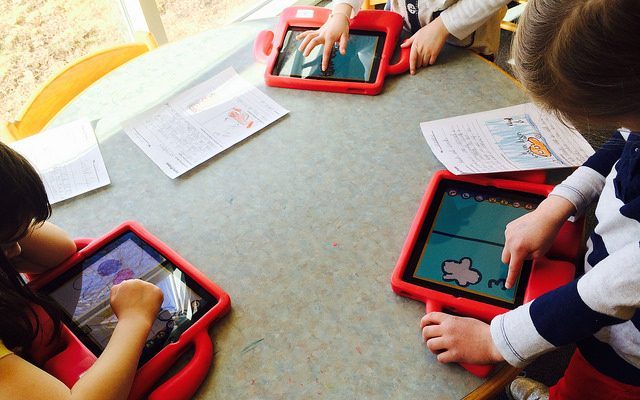The positive connection between games and online learning

By Mitch Weisburgh, cofounder of Games4Ed
Game-based learning has the potential to drastically improve the way children are taught.
Games have peculiar qualities that let them engage hard-to-reach students in a way lessons cannot. Researchers have begun to explore the intrinsic qualities of games that make them promising learning tools, and anecdotal evidence is available everywhere.
I personally know a student who struggled in history until Assassin’s Creed sparked his interest in the French revolution; he is now an honors history student. I know many students who spend hours playing Minecraft and many hours more learning new skills and techniques on YouTube, which they then apply to Minecraft. Clearly, a good game is a powerful motivator for learning. It engages the mind and the passions simultaneously, with obvious results. But why, and how, does this work, and how can we harness it in schools?
Who uses games? 99% of boys, 94% of girls, and 62% of teachers play video games.
Games foster ideal conditions for learning
There is a sweet spot for learning that lies between what a person can do without help, and what they can only accomplish with help. Lev Vygotsky coined the term zone of proximal development to describe this spot. In the zone of proximal development, the lesson is neither so easy that the student is bored, nor so difficult that he gives up.
Teachers use their training and skill to create lessons that fall into their students’ zone of proximal development, but Plass, Homer, and Kinzer show in Playful Learning: An Integrated Design Framework that successful games tend to aim toward this same zone. The tantalizing opportunity provided by games is a lesson that measures player skill, and then delivers an appropriate response automatically.
Gamers beware, however. According to Tobias et al, when the game mechanics become complex, the zone of proximal development is overshot and learning can be inhibited. Game designers “need to be mindful of the cognitive load imposed on players” to learn to play.
Games encourage growth
Games relate to another key aspect of learning. Carol Dweck pioneered the idea is that individuals who see themselves as evolving through hard work and dedication will grow their abilities, while those who see their talents as fixed traits will not. She called this the growth mindset paradigm, laid out in her book Mindset: The New Psychology of Success. Games reinforce the growth mindset through their treatment of failure.
Games that support a growth mindset allow for “graceful failure” by embedding low-stakes failure into the game mechanics. These games encourage balanced risk-taking and exploration. A player who fails at a well-made game immediately tries again, and when the player eventually succeeds, the idea of growth through practice is reinforced. Kris Mueller, an eighth grade teacher writing for Edutopia, wrote: “A well-designed game leads players through carefully-leveled tasks that prepare them to succeed in bigger challenges.”
Games improve spatial skills
There are literally hundreds of research and pseudo-research papers on games. A meta-analysis of more than 100 studies, Effects of video-game play on information processing: a meta-analytic investigation, found that studies generally agreed: games improve visual processing, visual-spatial manipulation of images, and auditory processing. The analysis, undertaken by Powers, Brooks, Aldreich, Palladino, and Alfieri, attributed much of the improvement to video games demanding that players interpret, mentally transform, manipulate, and relate dynamic changing images.
Games have significant value for education because the skills cultivated by games are widely applicable outside of games. Tobias, Fletcher, and Chen showed this in a review of 95 studies, Digital Games as Educational Technology: Promise and Challenges in the Use of Games to Teach (to be published later in 2015). They found “evidence of near and far transfer in applying learning from games to external tasks.”
Specifically, action games, often called First Person Shooter (FPS) games, improve attention, mental rotation, task switching, speed of processing, sensitivity to inputs from the environment, resistance to distraction, and flexibility in allocating cognitive as well as perceptual resources. Not only did people learn these skills from video games, there was a significant ability to transfer that learning to other activities.
Games are linked to STEM achievement and greater creativity
Spatial skills “can be trained with video games (primarily action games) in a relatively brief period” and that these skills “last over an extended period of time.” More excitingly, the improvement in visual-spatial skills is related to other, more scholarly, improvements. The Benefits of Playing Video Games (Granic, Lobel, and Egels in American Psychologist, January, 2014) noted that those learning these skills from video games show increased efficiency of neural processing. Improvements in spatial skills predict achievement in science, technology, engineering, and mathematics.
There are also links between playing video games and enhanced creativity, although we do not yet know the exact nature of the connection. Perhaps games enhance players’ creativity, or creative people tend to play video games, or some combination is at work.
Games foster engagement
One of the most important factors related to learning is time on task. It is highly related to proficiency and can be used to predict math proficiency to the nearest tenth of a grade placement. Yet, students are found to be thinking about topics entirely unrelated to academics a full 40% of the time while in classrooms. In fact, on average, high school students are less engaged while in classrooms than anywhere else.
In the Handbook of Positive Psychology in Schools, Shernoff and Chikszentmihalyi make two points that relate directly to the need for increased engagement. They found that enjoyment and interest during high school classes are significant predictors of student success in college, and that this engagement is a rarity in US schools.
High engagement is observed when students focus on mastering a task according to self-set standards or a self-imposed desire for improvement. You’ll remember that those standards are linked to the growth mindset outlined by Dweck. Engagement (enjoyment and interest) is represented by heightened concentration and effort in skill-building activities along with spontaneous enjoyment from intrinsic interest and continued motivation.
This relationship between time spent and skill applies to video games as well. The more time spent playing educational games, the greater the gain in skills and knowledge. Unlike class time, however, video games are great at capturing and holding attention. The average gamer spends 13 hours a week playing games.
It is not clear whether the positive effects of game-based learning stem from greater time spent learning, or increased efficiency in learning, or both. It is clear, however, that more time is spent learning when educational games are used than when they are not. Tobias et al report that those who learn using games, “tend to spend more time on them than do comparison groups.”
What makes an optimal learning environment?
Shernoff and Chikszentmihalyi propose conditions for an optimal learning environment which match strikingly with the benefits of educational gaming. An optimal learning environment:
- presents challenging and relevant activities that allow students to feel confident and in control
- promotes both concentration and enjoyment
- is intrinsically satisfying in the short term while building a foundation of skills and interests
- involves both intellect and feeling
- requires effort and yet feels like play
Their research shows that video games may foster this environment. Students using a video game approach made considerably greater learning gains than those in a traditional classroom, and were linked to a higher level of engagement.
Shernoff provides an example: a full semester college course, Dynamic Systems and Control.
A college course was designed around a video game in which students race a virtual car around a track for homework and lab exercises. The students reported a higher level of interest, engagement, and flow, and the video game was able to maintain “the high level of rigor inherent to the challenging engineering course while adding the perception of feeling active, creative, and in control characteristic of flow activities. The students who interacted with the video game also demonstrated greater depth of knowledge and better performance in the course.”
SRI, in research on GlassLab STEM games for K12, found that, for the average students, learning achievement increases by 12 percent when game based learning augments traditional instruction, and if the “game” is a simulation, achievement increases by 25 percent.
The research so far points to the tremendous value of games in education, and marks signposts for differentiating “good” and “bad” games. Yet there is still little knowledge on the most effective ways to produce games “the reliably yield pre-specified instructional objectives.” Also, it’s hard to know in advance if students will master a specific standard through X hours playing any one game.
A combination of games and other instructional methods has been shown to be especially effective. “Integrating games into the curriculum improves transfer from games to school learning tasks.”
Games, combined with other instructional strategies, may be the solution to Bloom’s two-sigma problem.
References:
Effects of video-game play on information processing: A meta-analytic investigation Powers, Brooks, Aldreich, Palladino, Alfieri; Psychonomic Society, 22 March, 2013
Digital Games as Educational Technology: Promise and Challenges in the Use of Games to Teach Tobias, Fletcher, Chen; Educational Technology, due in September or October 2015
Playful Learning: An Integrated Design Framework Plass, Homer, Kinzer; Games for Learning Institute; December, 2014
Flow in Schools Revisited Shernoff, Chikszentmihalyi, Handbook of Positive Psychology in Schools, Second Edition, Routledge, Taylor & Francis Group
Engagement and Positive Youth Development: Creating Optimal Learning Environments David J Shernoff, APA Educational Psychology Handbook, Chapter 8
Independent Research and Evaluation on GlassLab Games and Assessments, SRI, 2012, http://ww2.kqed.org/mindshift/2014/06/27/games-in-the-classroom-what-the-research-says/
The Benefits of Playing Video Games, Granic, Lobel, Engels; American Psychologist, January, 2014
_____
Mitch Weisburgh is the cofounder of Games4Ed.
Read all of our posts about EdTech and Innovation by clicking here.




